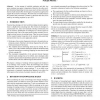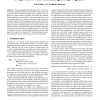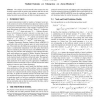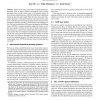ECAI
2010
Springer
14 years 4 months ago
2010
Springer
In classical revealed preference analysis we are given a sequence of linear prices (i.e., additive over goods) and an agent's demand at each of the prices. The problem is to d...
ECAI
2010
Springer
14 years 4 months ago
2010
Springer
Abstract. Interval temporal logics formalize reasoning about interval structures over (usually) linearly ordered domains, where time intervals are the primitive ontological entitie...
ECAI
2010
Springer
14 years 4 months ago
2010
Springer
We study the problem of fairly dividing a set of goods amongst a group of agents, when those agents have preferences that are ordinal relations over alternative bundles of goods (r...
ECAI
2010
Springer
14 years 4 months ago
2010
Springer
ECAI
2010
Springer
14 years 4 months ago
2010
Springer
As the amount of available ontologies and their size grow, ontology reuse gains in importance. However, the online available formalized knowledge in many cases need a revision whic...
ECAI
2010
Springer
14 years 4 months ago
2010
Springer
Abstract. The agent programming language GOLOG and the underlying Situation Calculus have become popular means for the modelling and control of autonomous agents such as mobile rob...
ECAI
2010
Springer
14 years 4 months ago
2010
Springer
The analysis of social networks often assumes the time invariant scenario while in practice node attributes and links in such networks often evolve over time. In this paper, we pro...
ECAI
2010
Springer
14 years 4 months ago
2010
Springer
Geographic information systems use databases to map keywords to places. These databases are currently most often created by using a top-down approach based on the geographic defini...
ECAI
2010
Springer
14 years 4 months ago
2010
Springer
Abstract. Human users trying to plan and accomplish informationdependent goals in highly dynamic environments with prevalent uncertainty must consult various types of information s...
ECAI
2010
Springer
14 years 4 months ago
2010
Springer
Abstract. In this paper we formulate a novel Divide-andCoordinate (DaC) algorithm, the so-called Egalitarian Utilities Divide-and-Coordinate (EU-DaC) algorithm. The Divide-andCoord...




